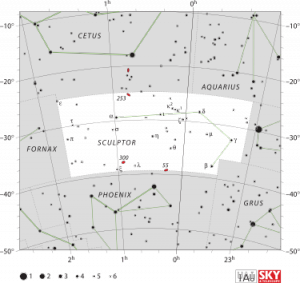Sculptor

Sculptor is a small and faint constellation in the southern sky. It represents a sculptor. It was introduced by Nicolas Louis de Lacaille in the 18th century. He originally named it Apparatus Sculptoris (the sculptor's studio), but the name was later shortened.
Sculptor is a small constellation bordered by Aquarius and Cetus to the north, Fornax to the east, Phoenix to the south,Grus to the southwest, and Piscis Austrinus to the west. The bright star Fomalhaut is nearby. ( See Four Royal Stars). The three-letter abbreviation for the constellation, as adopted by the International Astronomical Union in 1922, is 'Scl'.[2] The official constellation boundaries, as set by Eugène Delporte in 1930, are defined by a polygon of 6 segments. In the equatorial coordinate system, the right ascension coordinates of these borders lie between 23h 06.4m and 01h 45.5m, while the declination coordinates are between −24.80° and −39.37°
The constellation also contains the Sculptor Dwarf, a dwarf galaxy which is a member of the Local Group, as well as the Sculptor Group, the group of galaxies closest to the Local Group. The Sculptor Galaxy (NGC 253), a barred spiral galaxyand the largest member of the group, lies near the border between Sculptor and Cetus. Another prominent member of the group is the irregular galaxy NGC 55.
One unique galaxy in Sculptor is the Cartwheel Galaxy, at a distance of 500 million light-years. The result of a merger around 300 million years ago, the Cartwheel Galaxy has a core of older, yellow stars, and an outer ring of younger, blue stars, which has a diameter of 100,000 light-years. The smaller galaxy in the collision is now incorporated into the core, after moving from a distance of 250,000 light-years. The shock waves from the collision sparked extensive star formation in the outer ring.
HGS Session References
HGS Sessions - Clearing Hyperspace Phantom Matrix - 3/12/2015 [1]
References
Found in HGS Manual on Page 108 Found in HGS Manual on Page 115

